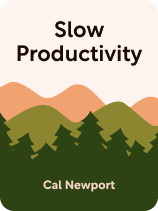

This article is an excerpt from the Shortform book guide to "Slow Productivity" by Cal Newport. Shortform has the world's best summaries and analyses of books you should be reading.
Like this article? Sign up for a free trial here.
Are you tired of feeling rushed and producing mediocre work? Do you want to create high-quality outputs that stand the test of time?
Cal Newport writes that a significant aspect of slow productivity is committing to excellence in everything you do. By adopting the mindset of master craftsmen who obsess over quality, knowledge workers can elevate their work and make a lasting impact.
Read on to learn strategies for prioritizing excellence and creating work you’re truly proud of.
Obsess Over Quality
The third principle of slow productivity is to obsess over quality. This becomes easier when you take on less and work at a natural pace. Newport recommends investing your time and, if necessary, your money into making sure what you do is the best it can be. Why is focusing on quality so important? For starters, it encourages you to slow down—because doing something well takes time—and makes this intentional pace not just acceptable but necessary. Consider the care and attention you’d want to give a project that truly matters to you; naturally, you’d want to take the extra time needed to refine and perfect it. This mindset not only leads to better outcomes but also makes the process more rewarding.
| Lessons From Craftsmanship Knowledge workers can learn from the philosophy of craftsmanship, which prioritizes quality, attention to detail, and continuous improvement. This approach values patience and dedication over speed, encouraging a deeper engagement with one’s work. Master craftsmen, like custom furniture makers or bookbinders, may spend decades perfecting their skills, exemplifying the importance of persistence and excellence. For example, renowned violin maker Antonio Stradivari embodied the philosophy of master craftsmanship. Stradivari carefully selected materials, constantly experimented with designs, and was committed to crafting the best possible sound. As a result of his commitment and innovation, his violins have stood the test of time and are still celebrated for their quality centuries later. For knowledge workers, Stradivari’s legacy suggests that applying similar principles to their tasks—prioritizing care, persistence, and excellence—can lead to work that exceeds standards and makes a lasting impact on their fields. |
Here are Newport’s tips for obsessing over quality in everything you do.
#1: Develop an Appreciation for Excellence
Newport also advocates seeking out examples of excellence in other fields. Whether through exploring influential books, engaging with art, or studying leading figures in your area of interest, knowing greatness when you see it helps elevate your work. (Shortform note: One way to ritualize seeking out excellence is through the practice of “artist dates,” as described by Julia Cameron in The Artist’s Way. Cameron argues that artist dates are an important way to nurture your creativity and refill your well of inspiration. By dedicating regular time to explore museums or attend performances or lectures, you create a habit of encountering exceptional work. This ongoing engagement with high-quality experiences broadens your perspective and fundamentally shifts your expectations for what’s possible in your work.)
#2: Devote Focused Time to Tasks
Dedicate focused time toward honing your craft or project, says Newport. This might mean setting aside specific times when you can focus without interruptions—times when others might not demand your attention. (Shortform note: Setting aside uninterrupted time can allow you to enter a flow state where you can perform at your highest level. A flow state, as described by psychologist Mihaly Csikszentmihalyi, is a mental state of deep immersion and concentrated effort during which individuals often lose track of time and experience peak productivity and creativity. Achieving this state regularly can significantly enhance the quality and efficiency of your work.)
#3: Adjust Financial Goals
If possible, Newport says to adjust your financial goals and lifestyle to prioritize producing high-quality work over making quick money. This means focusing on long-term satisfaction and meaningful outputs rather than immediate financial gains. For example, instead of taking on many low-paying, high-stress projects to earn quick cash, choose fewer, higher-quality projects that pay well over time. This approach helps you maintain a sustainable workload and deliver better results while achieving financial stability.
(Shortform note: In order to have the freedom to choose high-quality work over quick money, it’s important to first have a strong financial foundation. Tori Dunlap, financial expert and author of Financial Feminist, argues that every person needs an emergency fund that includes enough money to cover three to six months’ worth of living expenses. This strategic reserve grants you peace of mind and affords you the freedom to make choices in your life and career without fear of devastating financial implications.)
#4: Set Public Goals
Newport says that announcing deadlines adds a layer of accountability through external expectations; knowing people are waiting on the outcome can make you more motivated to produce high-quality work. (Shortform note: While deadlines might drive productivity, their overall impact on work quality and satisfaction is a matter of ongoing debate. Studies suggest deadlines can enhance performance by providing clear goals and a sense of urgency. On the other hand, some researchers argue that strict deadlines can induce stress, reduce task enjoyment, and limit creativity. You can find a balance by communicating realistic and flexible deadlines that encourage progress without compromising well-being or creativity.)
#5: Embrace Constructive Criticism
Engaging with a community that holds high standards can inspire you and provide you with valuable feedback on how to improve. Newport says that seeking out and responding to feedback can help you refine your work and push your skills to new levels.
(Shortform note: One approach to giving and receiving feedback is known as “radical candor.” It’s a management philosophy and feedback approach developed by Kim Scott, a former executive at Google and Apple. Radical candor emphasizes giving direct, honest feedback while also showing genuine care for the person receiving it. Scott argues that by combining empathy with honesty, radical candor creates an environment where constructive criticism is both given and received in a spirit of mutual growth and respect. Scott emphasizes that this method not only improves individual performance but also fosters a culture of trust and continuous improvement within organizations and communities.)

———End of Preview———
Like what you just read? Read the rest of the world's best book summary and analysis of Cal Newport's "Slow Productivity" at Shortform.
Here's what you'll find in our full Slow Productivity summary:
- The flaws with the traditional definitions of productivity
- The principles of Cal Newport’s “slow productivity”
- Why doing less actually means you’re doing more






